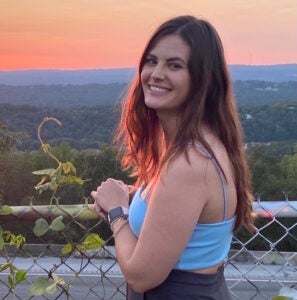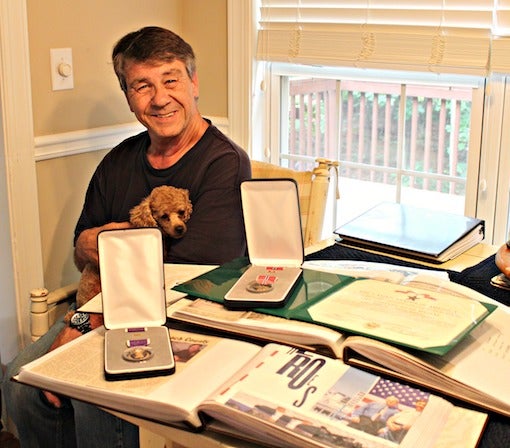By Carmen Brown
Photos Contributed
For the first time in her life, Lindsey Carbo feels free. Over a snack of Goldfish crackers and a few tears, she shared her story.
Both her parents were CEOs of major companies, and she grew up helping look out for her two younger twin brothers. Through it all, living in a high-stress environment contributed to her need to control her eating for the 27-year-old Atlanta native.
“It started casually at 16 and progressed over the last five years until it turned into a full-blown eating disorder,” Lindsey says. “I was going through a lot of stress in college at Appalachian State, and my parents were also going through a horrendous divorce. I was struggling to find my place.”
Lindsey eventually went to a hospital after experiencing heart palpitations. Doctors told her she was having an anxiety attack, but they also discovered a pre-cancerous tumor in her colon. “I became scared of food and started avoiding it. After COVID happened, I started losing weight at a very dangerous pace.”
Lindsey had been under-weight for most of her life, but with that diagnosis she had then reached a turning point. At 5-foot-8-inches and 94 pounds, Lindsey had reached her lowest weight ever, and she knew she needed to get help.

Lindsey Carbo
Her boyfriend found a therapist who specialized in eating disorders and referred her to different programs in the country. Of all of them, she chose Alsana to begin her path to healing and found herself in North Shelby County, Alabama.
Taken from the Latin term meaning “all” or “total health,” Alsana is a holistic eating disorder treatment center that currently has six locations: three in California, one in St. Louis and one in Alabama she came to.
Alsana uses what’s called the Adaptive Care Model to treat anorexia nervosa, bulimia, ARFID (avoidant restrictive food intake disorder), trauma, co-occuring chemical dependency, diabulimia and OSFED (other specified eating disorders).
What makes Alsana different is that this model of treatment considers the whole person, according to Chris Gorciak, vice president of marketing for Alsana. “The CEO got the best people in the industry together to figure out what is the best way to treat an eating disorder. They developed the adaptive care model that includes five dimensions: medicine, movement, nutrition, therapeutic and relational.”
As Chris explains, their clients go through an assessment where they’re placed in the appropriate level: residential, partial hospitalization or the intensive outpatient program. The Alabama location opened in August 2013 with its partial hospitalization program and intensive outpatient program and added its RTC residential program in February 2019.
Ronda Cannon, executive director of the Alabama location, says the area was chosen due not only to its location and size but also its safe, friendly and diverse community they knew to be tightly knit and welcoming.
As for Lindsey, she had never been to Birmingham prior to coming to Alsana, but she says her roommates and everyone there made her feel at home. “The locals showed me all the cool restaurants,” she says. “One night we got together at one of their homes and made a bonfire and had roasted popcorn.”
One of her favorite aspects of the program was Client Creations, where clients get together with one of Alsana’s chefs and make their own special recipe. “One of the chefs, Ashika, and I did a potato bar with pumpkin bread for dessert,” she says. “What made it so special is that we did this on the anniversary of the day my grandmother died.”
As a part of the treatment program, clients are monitored 24 hours a day by direct care staff who also spend time with the clients in the living room where they watch TV together and sometimes sing karaoke. “A lot of the staff is in recovery as well, so it made it easier to relate to them,” Lindsey says.
Based on the latest research, the adaptive care model Alsana uses appears to have a higher success rate than other forms of treatment used at other centers. “Overall, for all locations, last year we saw a 44 percent reduction in eating disorder symptoms,” Ronda says. “At the Birmingham location, that reduction was 41 percent. Our old data showed an average of 34 percent reduction in symptoms. We also see significant improvement in quality of life and self-compassion, and significant reductions in depression, compulsive exercise, trauma, and depression.”
Add to the scenario that mental health relational disorders have increased since COVID-19 began, and expansion plans are already set for 2021. “The waitlist has increased significantly,” Chris says. “Just the awareness of eating disorders has increased.”
Alsana’s current residential capacity is 18, and the partial hospitalization and intensive outpatient capacity is 24. Next year, though, the program will expand so that residential will have a capacity of 26 and partial hospitalization and intensive outpatient will have a capacity of 40. Alsana will also be opening another center in Huntsville with a 16-bed residential program and a 32-person capacity partial hospitalization and intensive outpatient.
Meanwhile, Lindsey is back in Atlanta, currently working at TJ Maxx and working on her English as a second language teacher certification with plans to attend graduate school.
“I had a lot of shame when I first began the program,” she says. “Letting go of shame has been freeing for me. I haven’t weighed myself since May. I really love my body now.”
Learn more about Alsana’s programs at alsana.com.










